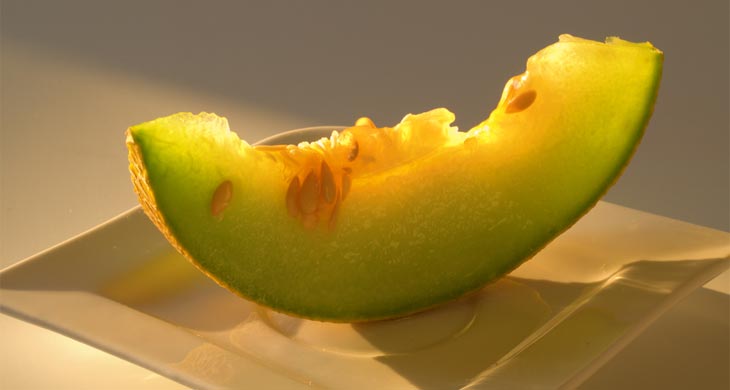MELON RELISH
Serves :
4
Preparation Time :
Cooking Time :

Preparation Method :
- Put the diced honey melon, raisins and onions into a saucepan together with the vinegar, curry powder, salt, pepper and the sugar and bring to the boil.
- Simmer to low flame and cook for about 10-12 minutes or until it reaches the desired consistency.
- Fold the chopped dill into the relish. Let the relish cool down before serving.
INGREDIENTS
- 250 grams honey melon, diced
- 50 grams raisins
- 2 onion, peeled and diced
- 1 diced chilli
- 1 teaspoon of curry powder
- 100 ml vinegar
- 100 grams sugar
- ½ bunch of dill, washed, dried and finely chopped
7 comments for “Melon Relish”
©Copyright 2012, lekhafoods, All Rights Reserved






























hi!! Exceptionally fascinating discourse happy that I went over such educational post. Keep doing awesome. Happy to be a piece of your net group. threesome dating sties
사설 토토사이트 메이저 안전놀이터 추천 메이저놀이터 주소 뱃사공 bebe40.com 카지노사이트 박근혜석방 도끼 일리네어 로또당첨번호 사회적거리두기 현대아파트재개발 카지노먹튀 토토놀이터추천 우리계열카지노 안전한토토사이트 토토사이트추천
메이저급 사설 스포츠토토사이트 스포츠토토사이트 추천업체 도메인 메이저 안전놀이터주소 안전놀이터주소 리스트 뱃사공의 안내서 오래된 토토사이트 추천목록 토토사이트 추천목록 참고사항 정리 안전한 안전공원 안전공원 스포츠분석 전문 먹튀없는 해외 토토사이트 해외 토토사이트 와 토토놀이터 스포츠전문가의 메이저 안전놀이터 메이저 안전놀이터 스포츠토토 추천 해외축구 스포츠 토토사이트 스포츠 토토사이트 뱃365 배당 좋은 안전 사설토토 안전 사설토토 하는 곳 좋은 사설 안전놀이터 사설 안전놀이터 도메인 믿을 수 있는 안전토토사이트 안전토토사이트 리스트 찐 토토사이트추천 토토사이트추천 홍보사이트 사설토토 메이저 안전놀이터메이저 안전놀이터 모음 스포츠토토 최고의 안전메이저놀이터 안전메이저놀이터 리스트 추천 무제재 토토사이트 목록 토토사이트 목록 놀이터추천 사이트 무사고 안전공원 주소 안전공원 주소 스포츠 전문 토토 해외안전놀이터 해외안전놀이터 뱃사공리스트 고배당 토토 놀이터추천 놀이터추천 뱃사공 가이드 이벤트 좋은 토토놀이터 추천 토토놀이터 추천 방법 사설 스포츠사이트 프로토승부식 프로토승부식 방법 토토업체 토토사이트 도메인 토토사이트 도메인 찾기 사설업체 안전 토토사이트 안전 토토사이트 찾는 법 전문 해외 안전놀이터 해외 안전놀이터 배당 먹튀없는 탑급 메이저사이트 탑급 메이저사이트 언옵 스포츠 안전놀이터추천 정보 안전놀이터추천 정보 승무패 야구배팅 토토사이트 홍보 토토사이트 홍보 정사이트 크로스 안전메이저놀이터 안전메이저놀이터 토토 실시간 고배당 안전놀이터 고배당 안전놀이터 사설 라이브스포츠 사설토토 추천 사설토토 추천 업체 환전 빠른 토토사이트 주소 토토사이트 주소 안전업체 탑3 해외 안전놀이터 해외 안전놀이터 업체 리스트 최고 안전한 찐 사설 토토 찐 사설 토토 사이트 정보 쩌는 안전놀이터추천 안전놀이터추천 설명 추천하는 공식 토토사이트 주소 공식 토토사이트 주소 뜻 검증 완료된 해외의 토토사이트 해외의 토토사이트 주소 정말 큰 메이저사이트 목록 메이저사이트 목록 추천 주소 정보들Took me time to read all the comments, but I really enjoyed the article. It proved to be Very helpful to me and I am sure to all the commenters here! It’s always nice when you can not only be informed, but also entertained! custom patches
I wanted to thank you for this excellent read!! I definitely loved every little bit of it. I have you bookmarked your site to check out the new stuff you post. amazon back scratchers
Softbank made commitments to secure jobs and keep ARM's headquarters in the UK until September next year. So far, when you read the announcement coming from Nvidia they said they will honour that Softbank has made at the time, said Sonja Laud, chief investment officer at Legal & General Investment Management. But with the expiry about to happen and obviously the Brexit negotiations under way it will be very interesting to see how this develops in the future. This appears to address concerns that British jobs would be lost and decision-making shifted to the US. Last week, the Labour Party had urged the government to intervene. But two of ARM's co-founders have raised other issues about the takeover. Hermann Hauser and Tudor Brown had suggested ARM should remain neutral, rather than be owned by a company like Nvidia, which produces its own processors. The concern is that there would be a conflict of interest since ARM's clients would become dependent on a business with which many also compete for sales. Moreover, the two co-founders also claimed that once ARM was owned by an American firm, Washington could try to block Chinese companies from using its knowhow as part of a wider trade clash between the countries. If ARM becomes a US subsidiary of a US company, it falls under the Cfius [Committee on Foreign Investment in the United States] regulations, Mr Hauser told BBC Radio 4's Today programme. That means that if hundreds of UK companies that incorporate ARM's technology in their products, want to sell it, and export it to anywhere in the world including China - which is a major market - the decision on whether they will be allowed to export it will be made in the White House and not in Downing Street. He added that he believed the pledge to retain and increase the number of UK jobs was meaningless unless UK ministers stepped in to make it legally enforceable. But ARM's chief executive played down the threat of export bans. It isn't to do with the ownership of the company, it's all to do with analysis of the product itself, Simon Segars told the BBC. The majority of our products are designed in the UK or outside the US, and the majority of our products don't fall under much of the US export control set of rules. Mr Huang added that ARM had some of the finest computer scientists in the world in Cambridge and he intended to both retain them and attract others to what would become Nvidia's largest site in Europe. The UK prime minister's spokesman said ministers have spoken to both companies, adding that the government would be scrutinising the deal including what it means for the Cambridge HQ. ARM creates computer chip designs that others then customise to their own ends. It also develops instruction sets, which define how software controls processors. It is based in Cambridge but also has offices across the world, including a joint venture in Shenzhen, China. Hundreds of companies license its innovations including Apple, Samsung, Huawei and Qualcomm. To date, ARM says 180 billion chips have been made based on its solutions. When Softbank acquired ARM, it promised to keep the company's headquarters in the UK and to increase the number of local jobs, which it did. Softbank's founder Masayoshi Son described the firm as being a crystal ball that would help him predict where tech was heading. But losses on other investments, including the office rental company WeWork, prompted a rethink. California-headquartered Nvidia overtook Intel to become the world's most valuable chipmaker in July. Until now, it has specialised in high-end graphics processing units (GPUs). These are commonly used by gamers to deliver more detailed visuals, as well as by professionals for tasks including scientific research, machine learning, and cryptocurrency mining. Nvidia is also one of ARM's clients, using its designs to create its line-up of Tegra central processing units (CPUs). Under the terms of the deal, Nvidia will pay Softbank $21.5bn in its own stock and $12bn in cash. It will follow with up to a further $5bn in cash or stock if certain targets are met. Nvidia will also issue $1.5bn in equity to ARM's employees. But experts say one risk Nvidia faces is that the takeover could encourage ARM's wider client list to shift focus to a rival type of chip technology, which lags behind in terms of adoption but has the benefit of not being controlled by one company. ARM is facing growing competition from RISC-V, an open-source architecture, wrote CCS Insight's Geoff Blaber in a recent research note. If its partners believed that ARM's integrity and independence was compromised, it would accelerate the growth of RISC-V and in the process devalue ARM. Mr Blaber also suggested regulators might block the deal. This process will take months if not years with a high chance of failure, he told the BBC. Mr Huang has said that he expects it to take more than a year to educate regulators and answer all their questions, but said he had every confidence they would ultimately approve Softbank made commitments to secure jobs and keep ARM's headquarters in the UK until September next year. So far, when you read the announcement coming from Nvidia they said they will honour that Softbank has made at the time, said Sonja Laud, chief investment officer at Legal & General Investment Management. But with the expiry about to happen and obviously the Brexit negotiations under way it will be very interesting to see how this develops in the future. This appears to address concerns that British jobs would be lost and decision-making shifted to the US. Last week, the Labour Party had urged the government to intervene. But two of ARM's co-founders have raised other issues about the takeover. Hermann Hauser and Tudor Brown had suggested ARM should remain neutral, rather than be owned by a company like Nvidia, which produces its own processors. The concern is that there would be a conflict of interest since ARM's clients would become dependent on a business with which many also compete for sales. Moreover, the two co-founders also claimed that once ARM was owned by an American firm, Washington could try to block Chinese companies from using its knowhow as part of a wider trade clash between the countries. If ARM becomes a US subsidiary of a US company, it falls under the Cfius [Committee on Foreign Investment in the United States] regulations, Mr Hauser told BBC Radio 4's Today programme. That means that if hundreds of UK companies that incorporate ARM's technology in their products, want to sell it, and export it to anywhere in the world including China - which is a major market - the decision on whether they will be allowed to export it will be made in the White House and not in Downing Street. He added that he believed the pledge to retain and increase the number of UK jobs was meaningless unless UK ministers stepped in to make it legally enforceable. But ARM's chief executive played down the threat of export bans. It isn't to do with the ownership of the company, it's all to do with analysis of the product itself, Simon Segars told the BBC. The majority of our products are designed in the UK or outside the US, and the majority of our products don't fall under much of the US export control set of rules. Mr Huang added that ARM had some of the finest computer scientists in the world in Cambridge and he intended to both retain them and attract others to what would become Nvidia's largest site in Europe. The UK prime minister's spokesman said ministers have spoken to both companies, adding that the government would be scrutinising the deal including what it means for the Cambridge HQ. ARM creates computer chip designs that others then customise to their own ends. It also develops instruction sets, which define how software controls processors. It is based in Cambridge but also has offices across the world, including a joint venture in Shenzhen, China. Hundreds of companies license its innovations including Apple, Samsung, Huawei and Qualcomm. To date, ARM says 180 billion chips have been made based on its solutions. When Softbank acquired ARM, it promised to keep the company's headquarters in the UK and to increase the number of local jobs, which it did. Softbank's founder Masayoshi Son described the firm as being a crystal ball that would help him predict where tech was heading. But losses on other investments, including the office rental company WeWork, prompted a rethink. California-headquartered Nvidia overtook Intel to Softbank made commitments to secure jobs and keep ARM's headquarters in the UK until September next year. So far, when you read the announcement coming from Nvidia they said they will honour that Softbank has made at the time, said Sonja Laud, chief investment officer at Legal & General Investment Management. But with the expiry about to happen and obviously the Brexit negotiations under way it will be very interesting to see how this develops in the future. This appears to address concerns that British jobs would be lost and decision-making shifted to the US. Last week, the Labour Party had urged the government to intervene. But two of ARM's co-founders have raised other issues about the takeover. Hermann Hauser and Tudor Brown had suggested ARM should remain neutral, rather than be owned by a company like Nvidia, which produces its own processors. The concern is that there would be a conflict of interest since ARM's clients would become dependent on a business with which many also compete for sales. Moreover, the two co-founders also claimed that once ARM was owned by an American firm, Washington could try to block Chinese companies from using its knowhow as part of a wider trade clash between the countries. If ARM becomes a US subsidiary of a US company, it falls under the Cfius [Committee on Foreign Investment in the United States] regulations, Mr Hauser told BBC Radio 4's Today programme. That means that if hundreds of UK companies that incorporate ARM's technology in their products, want to sell it, and export it to anywhere in the world including China - which is a major market - the decision on whether they will be allowed to export it will be made in the White House and not in Downing Street. He added that he believed the pledge to retain and increase the number of UK jobs was meaningless unless UK ministers stepped in to make it legally enforceable. But ARM's chief executive played down the threat of export bans. It isn't to do with the ownership of the company, it's all to do with analysis of the product itself, Simon Segars told the BBC. The majority of our products are designed in the UK or outside the US, and the majority of our products don't fall under much of the US export control set of rules. Mr Huang added that ARM had some of the finest computer scientists in the world in Cambridge and he intended to both retain them and attract others to what would become Nvidia's largest site in Europe. The UK prime minister's spokesman said ministers have spoken to both companies, adding that the government would be scrutinising the deal including what it means for the Cambridge HQ. ARM creates computer chip designs that others then customise to their own ends. It also develops instruction sets, which define how software controls processors. It is based in Cambridge but also has offices across the world, including a joint venture in Shenzhen, China. Hundreds of companies license its innovations including Apple, Samsung, Huawei and Qualcomm. To date, ARM says 180 billion chips have been made based on its solutions. When Softbank acquired ARM, it promised to keep the company's headquarters in the UK and to increase the number of local jobs, which it did. Softbank's founder Masayoshi Son described the firm as being a crystal ball that would help him predict where tech was heading. But losses on other investments, including the office rental company WeWork, prompted a rethink. California-headquartered Nvidia overtook Intel to become the world's most valuable chipmaker in July. Until now, it has specialised in high-end graphics processing units (GPUs). These are commonly used by gamers to deliver more detailed visuals, as well as by professionals for tasks including scientific research, machine learning, and cryptocurrency mining. Nvidia is also one of ARM's clients, using its designs to create its line-up of Tegra central
https://www.hasbihal.org Mircturk Mircturk.org İslam Sohbet Türk Sohbet Cinsel Sohbet Mevsim Sohbet